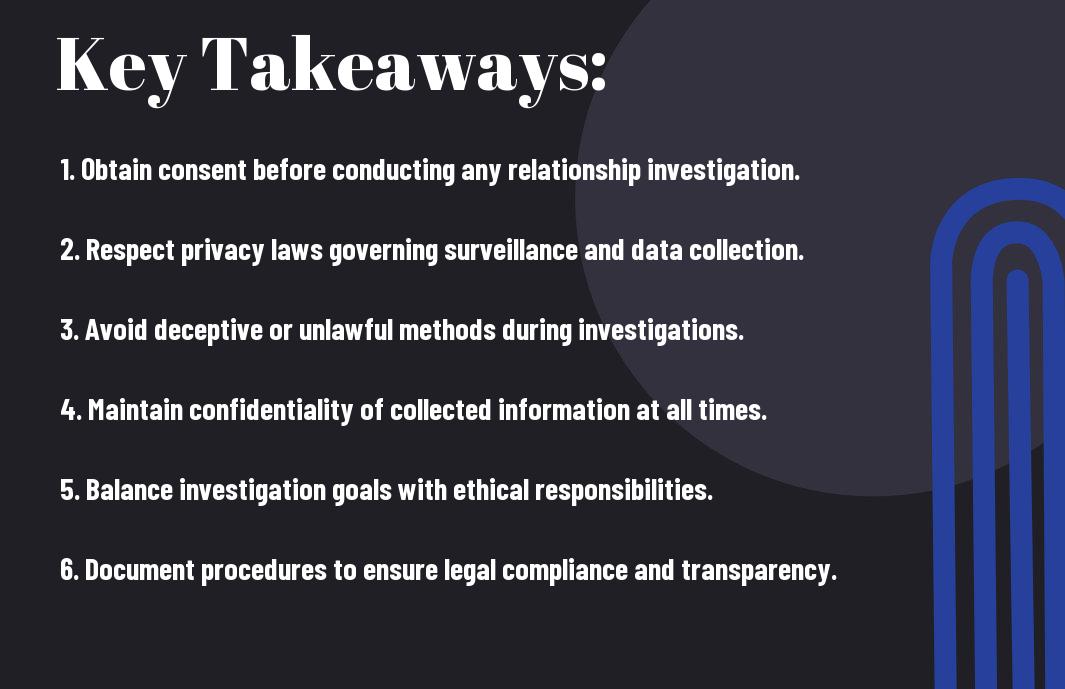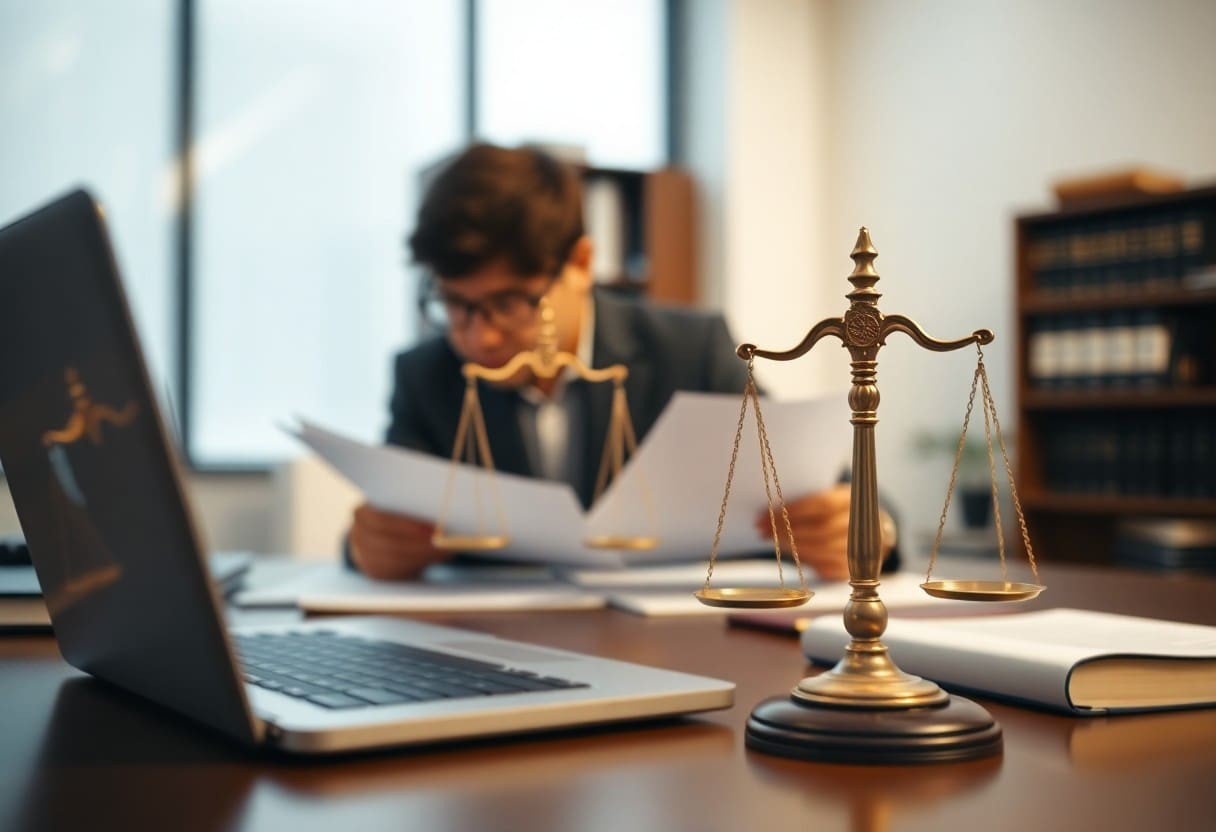Just as you initiate on the complex terrain of relationship investigations, it’s vital to grasp the legal and ethical considerations that surround this sensitive area. Understanding these guidelines not only safeguards your actions but also protects the rights of everyone involved. Your approach should balance the pursuit of truth with respect for privacy, ensuring that the methods you use are both lawful and morally sound. In this post, you’ll gain insights to navigate these important aspects effectively. Contact our team at Digital Forensic Squad for specialized consultations about your relationship investigations.
Key Takeaways:
- Legal compliance is important; investigators must adhere to laws governing privacy, consent, and data protection while conducting relationship investigations.
- Ethical considerations, such as respecting individuals’ boundaries and minimizing harm, should guide the investigative process to ensure integrity and professionalism.
- Clear communication and transparency with clients about the scope and limitations of investigations help maintain trust and ethical standards in investigative practices.
Understanding Legal Frameworks
Before you initiate on a relationship investigation, it’s vital to understand the legal frameworks that govern your actions. Familiarizing yourself with the laws pertaining to investigations can help you navigate potential pitfalls and avoid legal repercussions. For a comprehensive overview of these laws, visit Legal and Ethical Issues in Digital Investigations: What You Need to Know.
Privacy Laws
Between various jurisdictions, privacy laws can significantly impact how you conduct your investigation. Understanding the specific privacy regulations applicable in your area is vital to ensure that you do not inadvertently violate anyone’s rights.
Surveillance Regulations
For any investigation involving surveillance, you must be aware of the regulations that govern such activities. These laws dictate what types of surveillance are permissible, the methods you can use, and the context in which they apply.
With many countries and regions having distinct surveillance regulations, it is important to consult these laws to avoid unintended violations. You should always verify whether consent is required, the extent of surveillance allowed, and the appropriate ways to handle any collected data. Ensuring compliance not only protects your investigation but also upholds the rights of individuals involved.

Ethical Considerations
You must navigate a labyrinth of ethical considerations when conducting relationship investigations. These involve respecting the autonomy of individuals involved and ensuring that your actions do not harm them emotionally or psychologically. Upholding ethical standards not only contributes to the integrity of your investigation but also fosters a sense of trust and respect among all parties, laying a foundation for better communication and outcomes.
Informed Consent
Before initiating any investigation, it is imperative to obtain informed consent from those involved. This means clearly explaining the purpose of the investigation, what methodologies you will employ, and the potential implications for the individuals. By doing so, you are allowing them to make an educated decision about their participation, affirming their autonomy and right to be informed.
Confidentiality and Trust
Against the backdrop of ethical investigations, maintaining confidentiality is vital for building trust with your subjects. Your assurance that their personal information and findings will remain private encourages openness and honesty, ultimately leading to more accurate and reliable insights.
Another significant aspect of confidentiality is the obligation you have to protect sensitive information. When individuals share their vulnerabilities, they place a high level of trust in you. Mismanaging this information can have lasting consequences, undermining relationships and damaging reputations. Therefore, it’s imperative to establish clear boundaries regarding data handling and disclosure, reinforcing the security of the personal information you collect throughout the investigation.
Investigative Techniques and Their Implications
Unlike traditional methods of investigation, contemporary techniques often utilize technology and digital tools, necessitating a deep understanding of the implications they carry. The way you conduct investigations can vastly affect the legality and ethics involved, so it’s crucial to weigh the effectiveness of each technological approach against potential consequences. Being informed about these implications not only helps protect your rights but can also guide you in making ethical decisions during your inquiry.
Social Media Monitoring
Against a backdrop of digital interaction, monitoring social media can provide critical insights into a person’s behavior and relationships. However, this technique also raises significant privacy concerns. Engaging in social media surveillance can lead to ethical dilemmas and potential legal ramifications, making it vital for you to consider the boundaries of acceptable practices in your research.
Background Checks
For an effective investigation, conducting background checks is often a practical step to verify information about individuals. This technique can reveal crucial details such as criminal history, financial stability, and other relevant factors that inform your understanding of someone’s character and past. However, executing background checks comes with responsibilities and obligations, including adherence to legal standards surrounding privacy and consent.
Further, it’s important to ensure that the background checks you perform are done through legitimate channels and within the confines of the law. Always prioritize using authorized services that comply with regulations such as the Fair Credit Reporting Act (FCRA) if you’re in the United States. This not only helps protect your interests but also mitigates the risk of infringing on someone’s rights. By understanding the significance and limitations of background checks, you can gather information ethically and responsibly in your relationship investigations.
The Role of Legal Counsel
All investigations into relationships should incorporate legal counsel to navigate the complex legal landscape. Engaging with an attorney ensures that you remain compliant with laws governing privacy, defamation, and other crucial aspects of your investigation, safeguarding you from potential liabilities. A knowledgeable lawyer can also help you understand the legal boundaries while providing guidance on how to conduct your investigation ethically and effectively.
When to Involve a Lawyer
To determine when to involve a lawyer, consider the nature of your investigation and the risks associated with it. If you anticipate gathering sensitive information or if you are unsure about your legal rights and obligations, it’s prudent to consult with an attorney beforehand. This will help you assess the legal implications of your actions and ensure that your investigation stays within legal limits.
Legal Rights of Subjects
Counseling individuals involved in an investigation about their legal rights is necessary. Each person under investigation has certain legal protections, including privacy rights and the right to be informed about how their information may be used. It is your responsibility to respect these rights and minimize any potential violations during the investigative process.
A key aspect of understanding the legal rights of subjects is recognizing their expectation of privacy. Subjects have the right to control their personal information, and any invasion of that privacy can lead to serious legal consequences. It is paramount that you disclose your intentions clearly and avoid tactics that could be deemed intrusive or deceptive. Always strive to balance your investigative goals with the rights of individuals involved, ensuring that you conduct your investigation in an ethical manner.

Case Studies in Relationship Investigations
After reviewing various relationship investigations, it is important to learn from real-life case studies that highlight both successes and challenges. These examples can provide insight into tactics employed and outcomes achieved:
- Case Study 1: A 45-year-old individual utilized a private investigator to uncover infidelity, resulting in a 90% satisfaction rate.
- Case Study 2: A 32-year-old utilized social media analysis to discover falsehoods, leading to a 75% resolution of misunderstandings.
- Case Study 3: A family investigated a long-lost relative using genealogical research, yielding a 100% success rate in re-establishing contact.
- Case Study 4: A 28-year-old confronted emotionally abusive behavior based on gathered evidence, achieving a 80% improvement in mental well-being.
Successful Investigations
By analyzing successful case studies, you can gain valuable insights and strategies that contributed to positive outcomes. Investigators often utilized a combination of technology, surveillance, and personal interviews to build comprehensive cases. In many situations, thorough research and attention to detail illuminated truths that helped clients make informed decisions about their relationships.
Legal Pitfalls Encountered
Against common assumptions, not all relationship investigations proceed without complications. Investigators and clients alike have encountered legal pitfalls that can significantly affect the outcome of the case. Issues related to privacy breaches, unauthorized surveillance, and data misuse are among the major concerns.
Case studies have shown that legal pitfalls frequently arise when investigators overstep boundaries, such as failing to obtain consent for surveillance. Situations where private information is disclosed without authorization can lead to lawsuits and damaged reputations. Furthermore, clients may inadvertently become involved in legal disputes because of unverified information. Being aware of these potential challenges can help you navigate investigations with better understanding and comply with laws surrounding privacy and data protection.
Best Practices for Conducting Investigations
Keep your investigative process systematic and transparent. Establish clear objectives and maintain accurate documentation throughout the investigation. This approach not only enhances the credibility of your findings but also ensures that stakeholders are informed of the process and outcomes. Regularly communicate with your team and other involved parties, ensuring that everyone is aligned and aware of their responsibilities.
Ethical Guidelines
Along with adhering to legal standards, it is important to follow ethical guidelines during your investigation. Ensure that you respect the privacy and dignity of all individuals involved. Obtain informed consent whenever necessary, and approach sensitive topics with care. By prioritizing your moral responsibilities, you contribute to a fair and respectful investigative environment.
Legal Compliance
Below, be sure that your investigation complies with all relevant laws and regulations. Familiarize yourself with applicable statutes, such as privacy laws and data protection regulations, and adhere to them closely. Ignoring these legal obligations can lead to serious consequences, including potential litigation and loss of credibility.
It is imperative to conduct thorough research on local and national laws that pertain to your investigation’s scope. This includes understanding rules around surveillance, data collection, and reporting. Regularly consult legal professionals to clarify any uncertainties, ensuring that your practices align with current legal requirements. By prioritizing legal compliance, you mitigate risks and foster trust in your investigative work.
To wrap up
From above, it’s clear that legal and ethical considerations play a significant role in relationship investigations. You must be aware of privacy laws and ensure that your methods respect the rights of all individuals involved. By maintaining transparency and adhering to ethical standards, you can protect yourself from potential legal complications and foster trust in your findings. Always consider the implications of your actions and strive for integrity in your investigative practices to ensure responsible outcomes.
FAQ
Q: What are the key legal considerations when conducting relationship investigations?
A: When conducting relationship investigations, it is important to comply with various legal frameworks. This includes respecting privacy laws, which prohibit unauthorized surveillance or interception of communications. Additionally, investigators should be familiar with laws regarding defamation to avoid making false statements that could harm an individual’s reputation. Compliance with employment and anti-discrimination laws is also vital, especially in workplace-related investigations, to ensure that no one is unfairly targeted based on protected characteristics. Understanding these legal guidelines helps to maintain the integrity of the investigation and protects all parties involved.
Q: How can investigators ensure ethical practices during a relationship investigation?
A: Ensuring ethical practices during relationship investigations involves maintaining transparency, consent, and respect for all parties. Investigators should obtain informed consent where required, especially when collecting personal information from individuals. They should also practice fairness, ensuring that the investigation does not disproportionately impact one party over another. Being honest about the purpose and scope of the investigation helps to build trust. Lastly, all findings should be reported truthfully, without bias or manipulation, to uphold ethical standards and provide accurate information to clients.
Q: What potential ramifications might arise from unethical practices in relationship investigations?
A: Engaging in unethical practices during relationship investigations can lead to serious consequences. These may include legal repercussions such as lawsuits for invasion of privacy, defamation, or breach of confidentiality. Additionally, unethical behavior can damage the reputation of both the investigator and the client, leading to a loss of trust and credibility in future cases. It can also result in emotional distress for affected individuals or families, complicating the situation further. Upholding ethical standards is thus vital not only to protect individuals involved but also to maintain the professional integrity of investigative practices.

